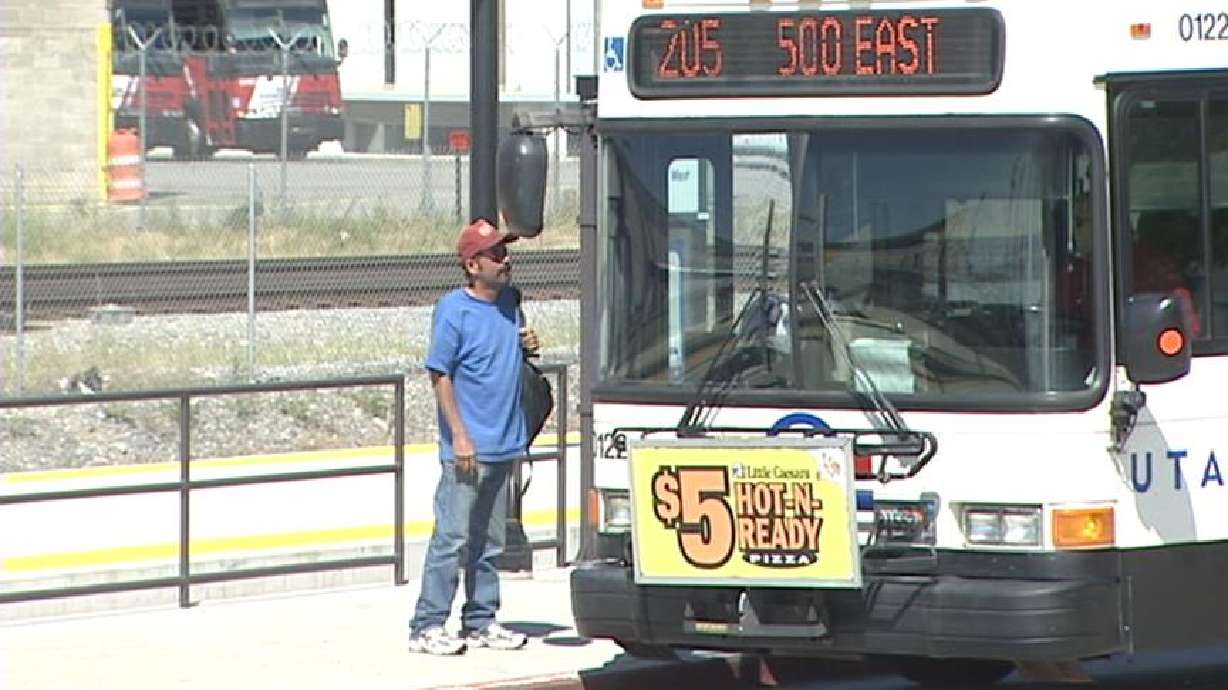Estimated read time: 3-4 minutes
This archived news story is available only for your personal, non-commercial use. Information in the story may be outdated or superseded by additional information. Reading or replaying the story in its archived form does not constitute a republication of the story.
SALT LAKE CITY — Residents and regular transit riders took turns taking the Utah Transit Authority to task Tuesday evening over its proposal to stop providing free bus service downtown.
UTA has asked the Salt Lake City Council for permission to discontinue the free-fare zone for buses, saying it's costing the agency roughly $194,000 a year in lost revenue.
Citizens speak out
Council members were asked repeatedly during a public hearing Tuesday night to deny that request.
Wylden Wulle called UTA's proposal "an attack on working and poor people."
"These cuts to the free-fare zone are really going to effect low-income people and those with limited mobility who depend on mass transit to get around," Wulle said.
It hurts small businesses. It hurts poor people, youth, elderly people, handicapped people. This (would have) a huge impact on people.
–Raphael Cordray, small-business owner
"Who's harmed by this, by eliminating the free-fare zone?" asked Raphael Cordray, a small-business owner in Salt Lake City. "It hurts small businesses. It hurts poor people, youth, elderly people, handicapped people. This (would have) a huge impact on people."
UTA wants to start charging for bus service downtown as soon as August, if the City Council agrees to allow it. UTA is not proposing to eliminate free fares downtown for TRAX.
There was little sympathy for UTA at the Salt Lake City-County Building on Tuesday evening. Several of those who spoke during a public hearing chided UTA for making its transit authority executives among the highest paid in the nation, while routinely raising fares and doing away with transit routes.
"(UTA's) problems are operational and with management," said David Shorten, a Salt Lake City resident. "They're not financial, and they can't be solved through a financial solution."
Deb Henry, another Salt Lake City resident, blamed the "ineptitude" of UTA management for not being able to handle their own operations.
"This transit system serves a social purpose in our community," Henry said. "I don't think the city should be concerned with the operations of UTA."
Reasons behind the proposed change
Bus drivers and transit police who attended the public hearing spoke in favor of the changes, saying the free-fare zone causes problems with collecting fares.
Because people can board buses in the free-fare zone and get off beyond its borders, bus drivers are put in the position of being a "town marshal," said Ross Larsen, chief of UTA's transit police.
"When people get on the bus, (the driver) is the one who makes sure they follow the rules," Larsen said.
Fare disputes sometimes lead to assaults on drivers, he said.
"I'm concerned about the safety of our operators, and I recommend modification of the free-fare zone for buses," Larsen said.
City Council's reaction
Councilman Luke Garrott has been a vocal opponent of the change, arguing that doing away with the free-fare zone for buses would take away some Salt Lake City residents' only access to transit.
Instead of continually seeking fare increases, we should be seeking the goal of a free system.
–Luke Garrott, SLC councilman
"I think UTA is going in the wrong direction on this issue," Garrott told those in attendance at the City Council meeting.
"We want to make it easier for people to ride public transit," he said. "Instead of continually seeking fare increases, we should be seeking the goal of a free system."
The City Council took no action on the issue Tuesday night. A second public hearing on the free-fare zone has been scheduled for July 17.
The free-fare zone has been in existence since 1985, resulting from an agreement between Salt Lake City and UTA to operate bus service in the downtown area.
UTA first floated the idea of changes to the free fare zone in December when the agency announced that it would investigate implementing a distance-based fare system similar to the one currently in use on the FrontRunner commuter-rail line.








